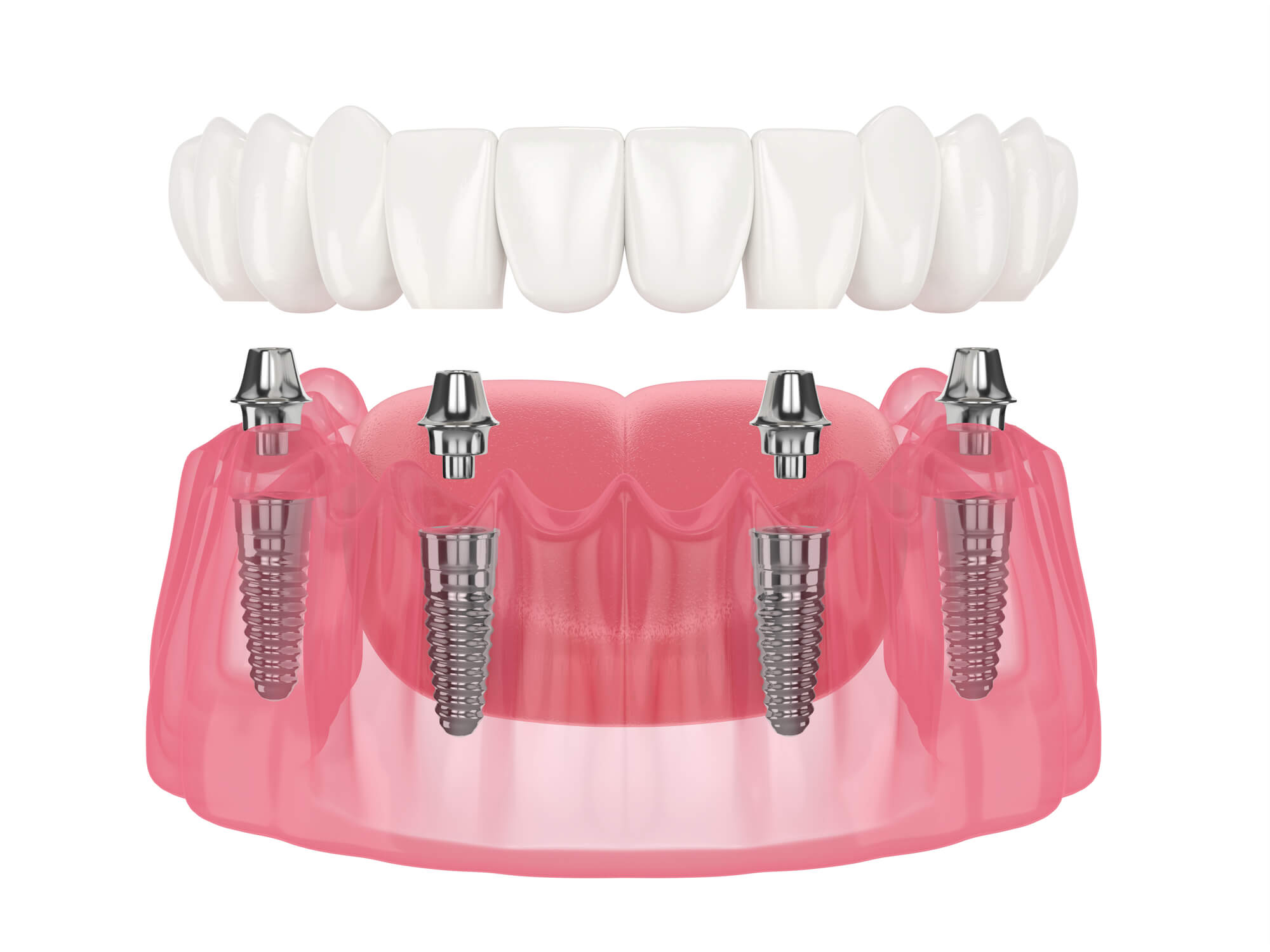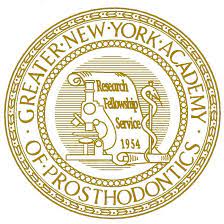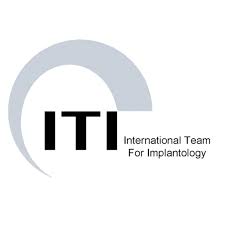All-on-4® in Coral Gables is a groundbreaking solution for individuals who need a dental restoration but suffer from significant tooth loss or severe dental issues. By strategically placing four dental implants, dentists can support a full arch of prosthetic teeth, allowing patients to recover their dental functionalities and enhance the appearance of their smiles.
Because of that, All-on-4® dental implants have become a very attractive replacement for natural teeth. Still, surgeries can seem scary to anyone. To help you understand and feel assured during this procedure, we'll explain the process step by step, how long it may take overall, and offer some key aftercare practices to ensure a prompt recovery.
Let’s go!

All-on-4® dental implants were developed as an alternative to 3-on-6 dental implants and dentures. Traditional dental implants require up to eight implants per arch, while the All-on-4® method uses only four. This is achieved by placing them at specific angles, which helps maximize the use of available bone while minimizing the need for bone grafting.
First, the implant abutment is inserted, and then a temporary prosthesis is attached to it. Once the bone has grown around the insert, the final crown is added. Overall, the entire process lasts four to six months.
All-on-4® dental implants provide optimal support and stability for the prosthetic teeth while requiring the minimal number of implants possible.
Here’s what the implant procedure looks like in more detail:
The All-on-4® implant process begins with an initial consultation. During this visit, one of our dental specialists will evaluate your overall oral health and determine if you are a suitable candidate for the procedure.
The dentist will review your medical and dental history to identify any conditions that might affect the surgery or its healing process. For instance, diabetes hampers a patient’s healing abilities, making implants a less attractive option.
Your clinical history then needs to be complemented by a thorough examination of your mouth, including the teeth, gums, and jawbone. Thankfully, advanced technology and imaging techniques such as X-rays and CT scans are helpful resources nowadays. They help assess the bone structure and identify the optimal sites for implant placement.
If you are deemed a suitable candidate, the dentist will develop a personalized treatment plan. This plan includes:
You may need to undergo certain preparatory steps before the surgery. First, excellent oral hygiene before and after the placement is key to reducing the risk of infection.
There are also certain dietary restrictions to follow, too, like not drinking alcohol—especially if sedation will be used. A few hours before the surgery, you will be indicated to fast. Lastly, we may prescribe antibiotics or other medications for you to take before and after the procedure to prevent infection and manage pain.
The All-on-4® implant surgery typically follows several steps. Overall, here’s what you can expect during the treatment:
After the surgery, you will receive detailed post-operative instructions. You will be prescribed pain medications to manage discomfort. There are also over-the-counter options that can help. Additionally, we’ll provide a soft diet to follow and prevent straining the recently inserted implants.
Proper oral hygiene is essential during this process. After your treatment, we’ll give you some tips on how to maintain good oral hygiene while avoiding iterating the surgical site. Lastly, you should avoid strenuous activities to ensure proper healing.
The implants need time to integrate with the jawbone, a process known as osseointegration. This period typically lasts three to six months. During this time, the jawbone grows around the implants, securing them firmly in place.
You will have regular follow-up appointments to monitor the healing process and ensure there are no complications.
Once the prosthesis is finished, we’ll remove the temporary one, and the permanent one will be attached to the implants using the abutments.
Once the prosthesis is finished, we’ll remove the temporary prosthesis, and the permanent one is attached to the implants using the abutments. Adjustments may be made to ensure a perfect fit.

All-on-4® implants have many advantages. Offering a permanent and stable alternative to removable dentures enhances a patient's ability to chew, speak clearly, and maintain general oral health.
Additionally, All-on-4® implants help preserve the jawbone. Besides that, other benefit this procedure offers are:
Aesthetically, All-on-4® implants offer a very natural-looking appearance. The prosthetic teeth are customized, aiming to mimic the appearance of your natural teeth.
Patients can choose the shade, shape, and size of their new teeth to achieve their desired look. All of this can improve confidence in their smile and foster their self-esteem.
All-on-4® implants offer increased stability and comfort. Unlike traditional dentures, they eliminate the need for adhesives and the risk of your prosthetics slipping or clicking.
The All-on-4® method is also very cost-effective compared to individual implants. It requires fewer implants and often avoids the need for bone grafting, making it a less invasive option.
Many patients report that this procedure has significantly improved their quality of life, including better eating habits, improved speech, and increased confidence.
The ability to enjoy a wide variety of foods and smile without hesitation is often also highlighted.
While All-on-4® implants have many advantages, there are some disadvantages to consider. The procedure requires sufficient healthy bone, and not all patients may be suitable candidates without prior bone grafting.
Patients with uncontrolled diabetes or certain medical conditions like gum disease may require additional treatments or alternative solutions. Additionally, if you suffer from bruxism, the strain placed on your new implant may hamper the osseointegration, causing it to fail.
Just like any surgical procedure, there are also some potential risks and complications associated with All-on-4® implants. These can include infection, implant failure, and nerve damage. Nevertheless, following your dentist’s post-operative care instructions can significantly reduce these risks.
In the long term, All-on-4® implants require regular maintenance to ensure their longevity. This includes professional cleanings and periodic assessments to monitor the condition of the implants and the surrounding oral tissues.
However, with proper care, All-on-4® implants can last many years. Some keys to the success of your dental restorations are:

All-on-4® dental implants represent a significant advancement in dental restoration, offering a reliable and effective solution for those with severe tooth loss. Moreover, advancements in dental technology have made All-on-4® implants more accessible and successful than ever before.
Digital imaging, computer-aided design, and guided surgery techniques have improved the precision and predictability of the procedure, leading to better outcomes and higher patient satisfaction.
By understanding the process, benefits, and potential drawbacks of All-on-4® Implants, you’re better equipped to make more informed decisions about your dental health. If you still have any questions, a qualified dentist from Coral Gables Dentistry is here to help.
Reach out, and let us know what we can do to help you!
Nobel Biocare, NobelProcera, NobelGuide and All-on-4 are trademarks of the Nobel Biocare group.

We value your time, so we always run on schedule, respecting your commitments, with no double bookings and minimal wait times. Experience dentistry like never before in our award-winning clinic.






